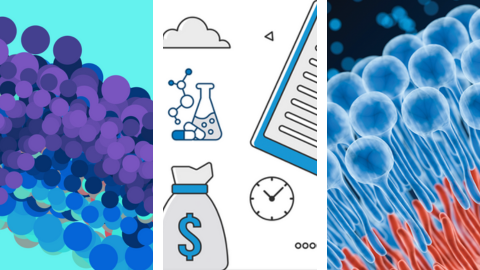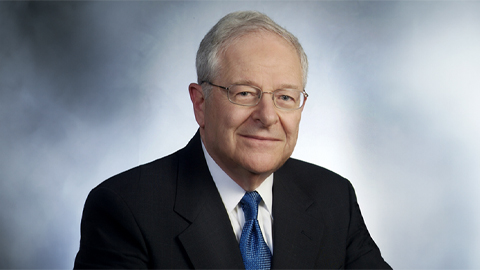Time, place and pay
Brandon Anjuwon–Foster is an associate research scientist and technical project manager in the vaccine sciences division at PPD, a global contract research organization. Prior to starting with PPD in December, Anjuwon–Foster conducted research in academic and government labs but ultimately decidedto pursue a career in industry. This column is about his experience in academia and government and what ultimately motivated him to transition into industry. My next column will be about the work he does at PPD.

Beginnings at the bench
Brandon Anjuwon–Foster didn’t think he wanted to be a researcher. His initial experiences in the lab in undergrad left him thinking he was bad at the bench, and a career in research didn’t seem to be in his future.
“I always gravitated toward science and mathematics, and I really enjoyed thinking about scientific questions and theory, but I just didn’t think I had good lab skills,” he said.
That changed when he participated in a research program called BRAIN (Behavioral Research Advancements in Neuroscience) at the Center for Behavioral Neuroscience in Atlanta, Georgia, during the summer before his last year as an undergraduate. He realized he actually really enjoyed bench research.
“I used the program as a litmus test to see if I could pursue a career in research, and it turned out I loved it,” he said. “I had just never been taught how to have good lab practice at the bench before, so having that exposure helped me realize I was capable in the lab.”
After earning his bachelor’s in neuroscience from George Mason University in Virginia, Anjuwon–Foster decided to continue with research and transitioned into a position supported by the National Institutes of Health’s postbaccalaureate research education program. This competitive program, run by the National Institute of General Medical Sciences, helps students from historically marginalized groups gain research experience before heading to graduate school.
Anjuwon–Foster won a position in the lab of Ralph Isberg at Tufts University, where he conducted infectious disease research. That experience further supported his decision to pursue a career in research and he next applied to Ph.D. programs.
In 2012, he started as a graduate student in Rita Tamayo’s lab at the University of North Carolina at Chapel Hill. Over the next six years, he worked on the bacterium Clostridioides difficile.
Toward the end of his Ph.D., he started critically thinking about what to do next. “I initially thought I wanted a career in academia, so I was exclusively looking for postdoc positions and only at the NIH,” he said.
Anjuwon–Foster’s decision to focus on opportunities at the NIH was multifaceted. First, he said, he knew that investigators at the NIH don’t have to write grants and secure funding the same way investigators do in academia. He thought his postdoc would therefore have more flexibility and freedom.
“NIH investigators can have a mix of high- and low-risk projects without having to worry about what’s fundable,” he said. “As a postdoc, I didn’t want to be necessarily tied to one project that’s tied to a specific aim on a grant. I thought I would have more freedom and creativity with my research project at the NIH.”
Second, Anjuwon–Foster said, the NIH is a “great place for career development.” He wanted to take advantage of all of the resources and programming the agency had to offer.
After interviewing for three positions, he ultimately joined the lab of Kumaran Ramamurthi in the National Cancer Institute, where he began researching noncanonical mechanisms of cell division in two bacterial species.
Factors leading to his decision to enter industry
It wasn’t long after starting his postdoc at the NIH that Anjuwon–Foster realized it wasn’t going to stick. After about two or three months, he decided he wanted to pursue a different career path.
His decision to leave academia wasn’t simple or easy. Part of it had to do with the restrictions he would face if he stayed, the first being time.
“I knew I didn’t want to do a postdoc for more than three years,” he said. “But I quickly realized that wasn’t realistic given the time it takes to get a project off the ground.”
Most postdocs take five or more years (or even multiple postdoctoral positions) before securing a faculty position, and Anjuwon–Foster didn’t see himself being happy with that timeline.
Geographic restraints were also a concern for him.
“As a Black man, I didn’t think I could comfortably live anywhere in the nation,” he said. “And with academic jobs, you have to be geographically flexible.”
Academic research positions are not abundant. Most candidates don’t really get to pick and choose where they end up. There was no guarantee that Anjuwon–Foster would land in a location where he’d feel safe and welcome.
Another restriction he didn’t want to face was financial. Most graduate students earn stipends in exchange for teaching and/or research commitments. Stipends vary greatly between universities, locations and programs, but most are less than $35,000 per year. Postdocs earn a little more, typically between $40,000 and $60,000 a year, depending on location and years of experience.
“I didn’t think I could justify paying my future grad students and postdocs so little,” Anjuwon–Foster said. “It would be difficult for me to keep someone as a postdoc paying them as little as that when they could get paid more in another position in industry with equal intellectual satisfaction.”
He knew he couldn’t change the system overnight, so he decided to change course and pursue a career in industry. He noted that he was lucky in that his mentor was supportive of him looking into other careers even though he had just started.

Securing a job in industry
Anjuwon–Foster’s first step was to reach out to people already working in industry to set up informational interviews. These interviews helped him learn what kind of jobs exist and how they differ. He said conducted upwards of 30!
“The interviews gave me great insight into the types of jobs I thought I would want to apply for,” he said. “I also got to learn more about careers I thought I would be interested in but realized that I didn’t want to pursue after hearing the information in the interview.”
He said cursory knowledge about a position isn’t enough, and informational interviews give insight into the nuances not found in the job description. He also took advantage of professional-development opportunities at the NIH, as he’d planned all along.
He eventually started seriously networking. (I’ve written before about networking in industry. Check out this article if you missed it.) Specifically, Anjuwon–Foster participated in the Scientist Mentoring and Diversity Program. This one-year career mentoring program pairs students or early-career researchers from diverse backgrounds with industry mentors who work at companies in the medical technology, biotechnology and consumer healthcare industries.
Anjuwon–Foster’s mentor, Doris Forestal at Johnson & Johnson, helped him tailor his résumé, draft an effective cover letter, prepare for job interviews and learn how to negotiate salary after getting an offer. She also gave him general advice about how to succeed in industry. He attended biotech conferences to connect with other professionals in industry, too.
Differences in industry
Anjuwon–Foster now works for PPD, a global contract research organization (commonly referred to as a CRO). He is an associate research scientist and technical project manager.
Many of his responsibilities are managerial. He plays lead and supportive roles in keeping developmental projects and personnel on track. I will go into more detail about what his position entails in my next column, so check back in three weeks!
Anjuwon–Foster said that he got his job after seeing the job listing, applying and being the right fit. But he said this isn’t always the case.
“A lot of industry jobs are landed through networking,” he explained. “That’s part of why informational interviews and making connections with people can be so important.”
Of course, there are many differences between conducting research in industry and conducting research in an academic or government setting. Anjuwon–Foster said there are both perks and drawbacks to the industry side of things.
For him, one of the biggest perks is working on highly translational research. He said he’s always been drawn to research due to the impact it could have on society and health in general. Now, he works on projects relating to vaccine development, and the data he helps collect will be evaluated by the Food and Drug Administration, the regulatory body in the United States that approves the biotechnologies and therapeutics that become available to consumers.
“I know what I’m working on could go to market and have an impact,” he said. “If the results of these projects help us get the vaccine approved, I’ll have been a part of that process and that’s exciting.”
He adds that the pay and benefits are significantly better than what he was getting in his previous positions as well.
“We work in a matrix environment, meaning we work in teams,” he said. “I didn’t really understand what this meant until coming to industry, but I’ve ended up really liking the team environment and the productivity it can produce.”
Anjuwon–Foster is a part of one facility, but his research project spans four different research facilities. This means that each person or group within the different facilities will have different tasks, but with one shared goal or outcome in mind. He said he was pleasantly surprised by how productive this approach can be compared to, say, how a grad student or postdoc would work alongside a few other people but largely independently.
There are a few drawbacks to a job in industry though.
“I’m no longer in the driver’s seat,” Anjuwon–Foster said. “There are opportunities to make changes, but there’s overall generally less to tweak during the research process because it is more regulated.”
He also said he doesn’t feel as intellectually satisfied in his current role, but he thinks there is the possibility for more satisfaction in a different type of research and development position within industry.
“There’s a lot of breadth in my current position, and I’m working on a lot of different projects, which I enjoy,” he said. “But there’s not as much depth, and we don’t get into the nitty-gritty as much as academia.”
He said his type of research is largely influenced by his current role in a regulated lab environment, which has more constraints than other industry research labs that may focus more on discovery.
Advice and guidance
Anjuwon–Foster has a few key pieces of advice for those looking to transition into industry.
First, start conducting informational interviews early. He said you can find people to connect with on LinkedIn and cold message them to tell them you’re interested in their career background and how they got where they are. Many will be willing to talk to you about their experiences and give advice.
Networking can help further extend the number of contacts you have in industry as well. This can be easier if you live in a biotech or pharma hub, where local societies or organizations may have semiregular meetings. But even at large or local conferences you can make connections with representatives from industry. Or you can take advantage of the career-development resources at your university or place of work.
“Meeting people and networking is the best way to secure a position in industry,” Anjuwon–Foster said. “You can also get a lot of great advice about how to tailor a cover letter for a certain position by talking to people in similar positions.”
Lastly, Anjuwon–Foster suggested picking your graduate or postdoc research lab thoughtfully if you think you want to pursue a career in industry. He said he would have been more strategic about choosing his postdoc lab if he had decided industry was what he wanted sooner.
“My postdoc research … wasn’t very applied or translational,” he said. “If I could go back, I would have tried to choose a lab or project that gave me transferable skills to make me more attractive as an industry recruit.”
In his field of vaccine development, this would have included techniques like flow cytometry and CRISPR. But there isn’t one set of techniques or skills to learn that will make you perfectly suited for all industry research roles.
Overall, if you’re interested in changing careers (into industry or otherwise), the best piece of advice is to talk to others in that field. Getting a sense of what kind of jobs you would or wouldn’t like will help you make more informed decisions during your application prep and job search.
Come back in three weeks to read my next column about Anjuwon–Foster’s position as an associate research scientist and technical project manager at PPD!
Enjoy reading ASBMB Today?
Become a member to receive the print edition monthly and the digital edition weekly.
Learn moreFeatured jobs
from the ASBMB career center
Get the latest from ASBMB Today
Enter your email address, and we’ll send you a weekly email with recent articles, interviews and more.
Latest in Careers
Careers highlights or most popular articles

Grad students: Get to know your program coordinator
They provide advice about interviews and admissions, curriculum, degree requirements, graduate program policies and information, campus services and more.

Upcoming opportunities
Molecule of the year nominations are due Friday! Plus: A new Finding the Funds webinar and LRD seminar are coming up later this month.

Consider an undergraduate summer research internship in government
Our careers columnist offers a rundown of agencies that can provide you with a couple of months of lab experience.

Upcoming opportunities
Putting ASBMB conferences on your radar! Plus: Award nominations are due Friday.

Upcoming opportunities
Putting ASBMB conferences on your radar! Plus: Award nominations are due Friday.

Retiring a research lab
Careers columnist Courtney Chandler talks to Art Spector, a former principal investigator, about making a graceful exit from the bench.

